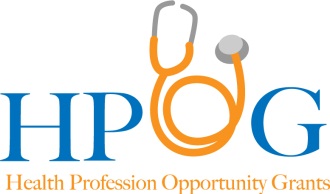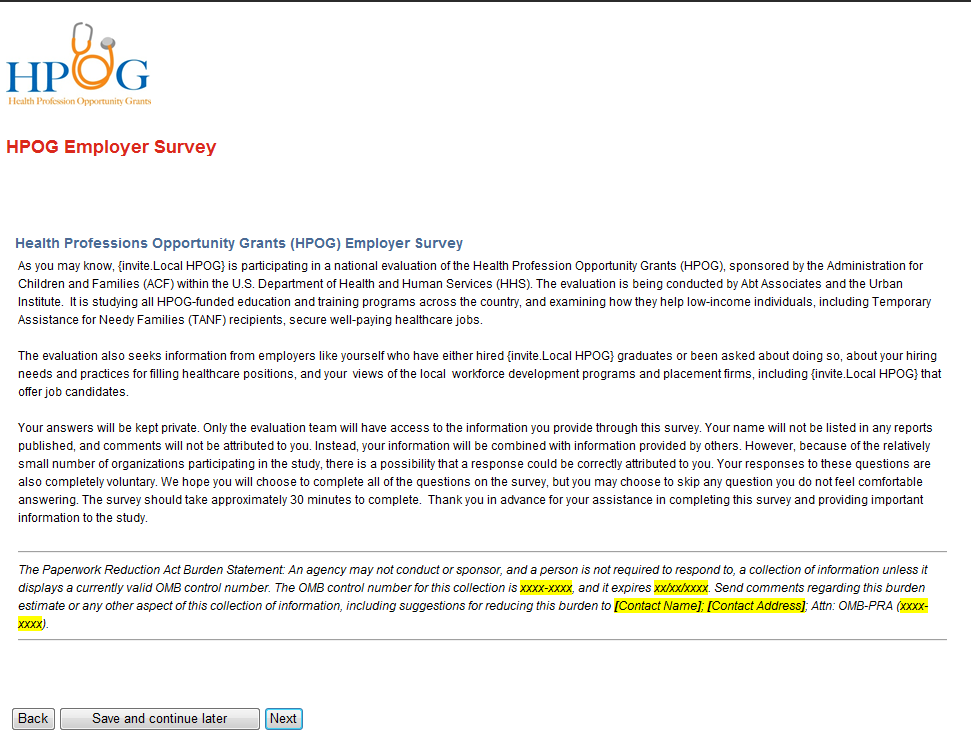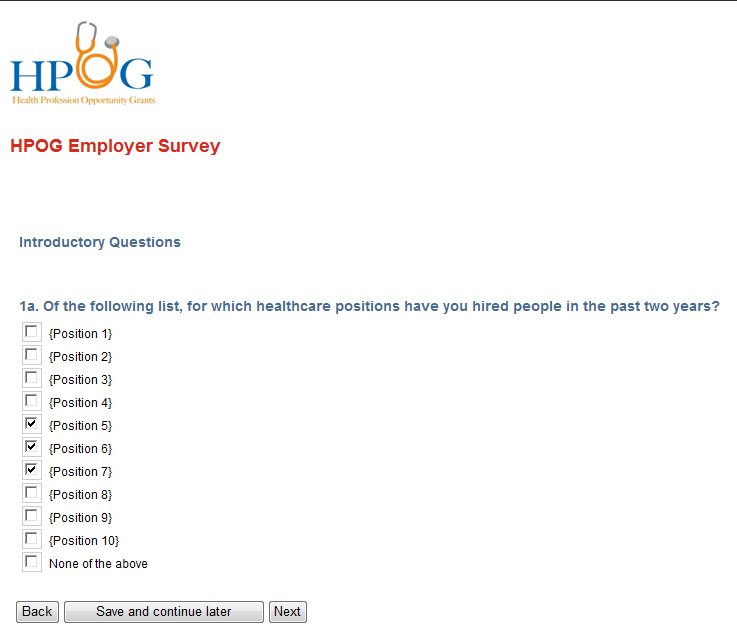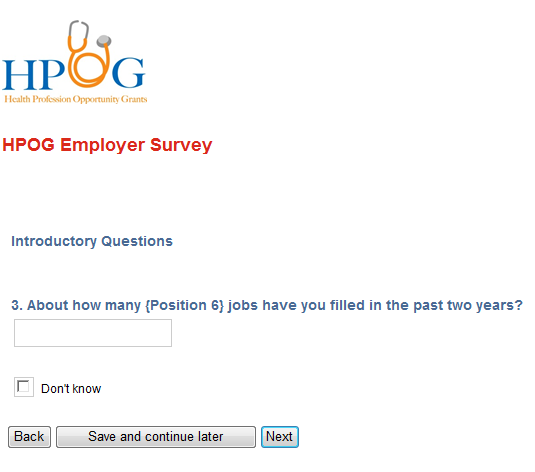HPOG-NIE Employer survey
Health Profession Opportunity Grants (HPOG) program
HPOG Appendix H Employer Survey revised 7 5 13
HPOG-NIE Employer survey
OMB: 0970-0394
Supporting Statement for OMB Clearance Request
Appendix H: HPOG-NIE Employer Survey
National Implementation Evaluation of the Health Profession Opportunity Grants (HPOG) to Serve TANF Recipients and Other Low-Income Individuals and HPOG Impact Study
0970-0394
April 24, 2013
Revised July 5, 2013
Submitted by:
Office of Planning,
Research & Evaluation
Administration for Children & Families
U.S. Department of
Health
and Human Services
Federal Project Officers:
Molly Irwin and Mary Mueggenborg
Appendix H: HPOG-NIE Employer Survey

Health Profession Opportunity Grants (HPOG)
Employer Survey
[Name of employer]:
Thank you for agreeing to be interviewed for the Employer survey of the Health Profession Opportunity Grants (HPOG) national evaluation. The evaluation is sponsored by the Administration for Children and Families (ACF) within the U.S. Department of Health and Human Services (HHS), and is being conducted by Abt Associates and the Urban Institute. The Employer survey seeks information about your hiring needs and practices for filling healthcare positions; and your perceptions of the HPOG program and of its graduates as job candidates and employees.
We ask you to answer the interview questions as accurately as possible, and to feel free to ask me, the interviewer, to repeat a question or define a term.
Your answers will be kept private. However, because of the relatively small number of organizations participating in the study, there is a possibility that a response could be correctly attributed to you. Only the HPOG evaluation team will have access to the information you provide through this survey. Your name will not be listed in any reports published, and comments will not be attributed to you. Your responses to these questions are also completely voluntary. The survey interview should take approximately 30 minutes to complete. Thank you in advance for your assistance in completing this survey and providing important information to the study.
[Survey roadmap and instructions will be inserted about here for online respondents.]
NOTES TO REVIEWERS
This survey is for employers that have been identified by HPOG grantees as having hired HPOG graduates or having been contacted by HPOG with the purpose of trying to place HPOG participants in healthcare jobs.
We will be making every effort in our initial contacts to identify a respondent at that employer who has familiarity with this HPOG connection. The survey instrument assumes the person answering has some (perhaps limited) knowledge of the HPOG grant or local HPOG program in this placement capacity. We are assuming we will NOT administer the survey to someone who has no knowledge of HPOG.
Employers that are ALSO active partners with HPOG (e.g., involved in the design and/or operations of the local HPOG program) will answer the Stakeholder/Network survey as well.
The survey is designed for administration by either telephone with an interviewer, or as a web-based survey. Most employers will likely need to be contacted to have the survey administered by phone, with the exception of employers who are completing the web-based Stakeholder/Network survey. The latter will be able to complete the web-based Employer survey as part of the Stakeholder/Network survey.
The Paperwork Reduction Act Burden Statement: An agency may not conduct or sponsor, and a person is not required to respond to, a collection of information unless it displays a currently valid OMB control number. The OMB control number for this collection is xxxx-xxxx, and it expires xx/xx/xxxx. Send comments regarding this burden estimate or any other aspect of this collection of information, including suggestions for reducing this burden to [Contact Name]; [Contact Address]; Attn: OMB-PRA (xxxx-xxxx).
Notes
Programming instructions and instructions to phone interviewer are in blue font.
Prefilled text from previous responses is denoted in green font.
Rollover definitions are shaded in aqua.
[PHONE INTERVIEWER: IF THE RESPONDENT REFUSES TO ANSWER A QUESTION, MOVE ON TO THE NEXT ONE.]
Introductory Questions
We are interested in knowing about your recent healthcare job openings that are at a skill level that could potentially be filled by graduates of the [name of grantee institution or local HPOG program]. These are usually jobs that require training but not a college degree.
1a. Of the following list of types of healthcare jobs, which is the most common healthcare occupations for which you have you hired people in the past two years?
1b. Please tell us what is the most common healthcare job opening you have had in the past two years that could potentially be filled by graduates of [name of grantee institution or local HPOG program]? Please use a generic title that describes the type of job and would be generally recognizable in your industry (such as phlebotomist or lab technician), as opposed to a firm-specific title.
_______________________________________________________________________
[PHONE INTERVIEWER: FILL IN VERBATIM ANSWER. IF THE EMPLOYER PROVIDES A FIRM-SPECIFIC OCCUPATIONAL TERM, YOU MAY NEED TO PROBE FURTHER ABOUT THE POSITION’S RESPONSIBILITIES TO SPECIFY THE CORRESPONDING GENERIC OCCUPATIONAL TERM.]
2. About how many [most common occupation] jobs have you filled in the past two years?
______________________________ JOBS
DOES NOT KNOW
3a. Do you anticipate this same occupation will have the most openings to fill in the coming year?
YES (IF YOU ANSWERED “YES,” GO TO Part A.)
NO
DOES NOT KNOW (IF YOU ANSWERED “DOES NOT KNOW,” GO TO Part A.)
3b. What healthcare occupation do you anticipate having the most openings to fill in the coming year?
_______________________________________________________________________
[PHONE INTERVIEWER: FILL IN VERBATIM ANSWER. IF THE EMPLOYER PROVIDES A FIRM-SPECIFIC OCCUPATIONAL TERM, YOU MAY NEED TO PROBE FURTHER ABOUT THE POSITION’S RESPONSIBILITIES IN ORDER TO IDENTIFY THE CORRESPONDING GENERIC OCCUPATIONAL TERM.]
Part A. General Business Questions
Now are a few general questions about your organization.
4. Is your organization in the healthcare or health services industry?
YES
NO (IF YOU ANSWERED “NO,” GO TO 6.)
DOES NOT KNOW (IF YOU ANSWERED “DOES NOT KNOW,” GO TO 6.)
5. Which of the following best describes your healthcare organization? Please respond Yes or No to each of the following options.
|
NO |
YES |
DOES NOT KNOW |
|
|
|
|
|
|
|
|
|
|
|
|
|
|
|
|
|
|
|
|
|
|
|
|
|
|
|
|
|
|
|
|
|
|
|
|
|
|
|
|
|
|
|
|
|
|
|
|
|
|
|
|
|
|
|
|
|
|
|
|
SKIP TO 7.
6. In what type of industry or business is your organization engaged? What is the main activity, service, or product area of your business?
[PHONE INTERVIEWER: RECORD VERBATIM.]
TO ONLINE RESPONDENT: Please describe.
_______________________________________________
7. Is this organization a for-profit or a non-profit company/organization?
FOR-PROFIT
NON-PROFIT
DOES NOT KNOW
[PHONE INTERVIEWER AND PROGRAMMER: IF RESPONDENT COMPLETED THE STAKEHOLDER/NETWORK SURVEY, SKIP TO 9.]
8. How many individuals does your organization employ on a full-time basis? If at multiple locations, please include all locations. (Your best estimate is fine.)
Fewer than 10 employees
10 to 19 employees
20 to 49 employees
50 to 99 employees
100 to 499 employees
500 or more employees
DOES NOT KNOW
9. Does this organization operate at more than one location?
YES
NO (GO TO PART B.)
DOES NOT KNOW (GO TO PART B.)
10. How many individuals are currently employed by your organization at the location where you work or are dispatched from this location? (Your best estimate is fine.)
Fewer than 10 employees
10 to 19 employees
20 to 49 employees
50 to 99 employees
100 to 499 employees
500 or more employees
DOES NOT KNOW
11. Would you say there are more workers or fewer workers where you are assigned now than a year ago?
More workers
Fewer worker
About the same
DOES NOT KNOW
[CONTINUE TO PART B.]
Part B. Hiring Practices
Next, are questions about your practices for filling [most common occupation] jobs.
12a. How have you typically identified the workers you have hired for [most common occupation] jobs? Please respond Yes or No to each of the following options.
|
NO |
YES |
DOES NOT KNOW |
|
|
|
|
|
|
|
|
|
|
|
|
|
|
|
|
|
|
|
|
|
|
|
|
|
|
|
|
|
|
|
|
|
|
|
|
|
|
|
|
|
|
|
|
|
|
|
|
|
|
|
|
12b. You responded “Yes” to the following options for identifying workers for [most common occupation] positions. Which of these do you regard as the most important?
[PHONE INTERVIEWER: RECORD VERBATIM.]
[IF “Temporary staffing agency” IS SELECTED, CONTINUE TO 13. ELSE, SKIP TO 14.]
13. When you use temporary staffing agencies to fill openings, how often do you hire the temp assigned to your organization as a permanent employee if his/her performance is satisfactory?
Using a scale of 1 to 5, where 1 = Never and 5 = Always, please indicate how frequently you hire the temp assigned to your organization as a permanent employee if his/her performance is satisfactory.
Scale |
||||
1 Never |
2 |
3
|
4 |
5 Always |
14. Before hiring workers for [most common occupation] openings, do you require a criminal background check?
(Respond “Yes” if either your organization or another conducts the criminal background check.)
YES
NO
DOES NOT KNOW
15. Do you have applicants take any of the following screening tests at any point during the hiring process until a final offer is made? Please respond Yes or No to the following options.
|
NO |
YES |
DOES NOT KNOW |
|
|
|
|
|
|
|
|
|
|
|
|
|
|
|
|
|
|
|
|
|
|
|
|
16a. Is there an industry-recognized skill certification or state-recognized license/certification for a [most common occupation] job? Please answer Yes or No.
YES
NO (GO TO 17)
DOES NOT KNOW (GO TO 17)
16b. For a [most common occupation] position, how important is it that the applicant has an industry-recognized skill certification or state-recognized license/certification before starting the job?
The corresponding certificate or license is required
The corresponding certificate or license is important, but an individual is allowed to get it within the first months on the job.
The corresponding certificate or license is somewhat important, but it is not required.
The corresponding certificate or license is not important.
DOES NOT KNOW
17. How much does each of the following factors weigh into your hiring decisions for [most common occupation] positions? Using a scale of 1 to 5, where 1 = Not at All and 5 = A lot, please indicate how much each factor matters for your hiring decisions for [most common occupation] positions.
|
Scale |
|
||||
|
Not at All 1 |
2 |
3 |
4 |
A lot 5 |
DOES NOT KNOW |
a. Job-related specific skill training |
|
|
|
|
|
|
b. High school completion |
|
|
|
|
|
|
c. Education beyond high school |
|
|
|
|
|
|
d. English language proficiency |
|
|
|
|
|
|
e. Experience in the same or related occupation |
|
|
|
|
|
|
f. References |
|
|
|
|
|
|
g. School performance |
|
|
|
|
|
|
h. Completion of a sample task |
|
|
|
|
|
|
i. Appearance or dress |
|
|
|
|
|
|
j. Desire to work hard |
|
|
|
|
|
|
k. Willingness to work odd or flexible hours |
|
|
|
|
|
|
l. Having a positive attitude |
|
|
|
|
|
|
m. Performance at interview |
|
|
|
|
|
|
n. Other (Please specify): ________________________ |
|
|
|
|
|
|
[IF SPECIFIC SKILL TRAINING WEIGHS INTO HIRING DECISIONS “A LOT” OR “SOME,” CONTINUE TO 18. ELSE, SKIP TO 19.]
18. How important are certificates of training completion when considering hiring someone who has received job-related skill training?
Required
Somewhat important, but not required
Not important
DOES NOT KNOW
19. Would you hire someone with a criminal record for a [most common occupation] position?
Yes
Yes, depending on the type or seriousness of the crime
No
DOES NOT KNOW
20. Would you say it is easy, somewhat challenging, or very challenging to find qualified applicants for a [most common occupation] position at the present time?
Easy
Somewhat challenging
Very challenging
DOES NOT KNOW
21. In the past two years, how often have you hired someone for a [most common occupation] position who did not meet all of the selection criteria you usually use because you really needed to fill the position?
Never
Occasionally
Frequently
DOES NOT KNOW
22. Some employers provide training and other professional development opportunities for advancement to their employees. We would like to ask you about this for workers you hire into a [most common occupation] position. Do you offer any of the following professional development opportunities to workers whom you hire into these positions? Please answer either yes or no to each of the following options:
|
NO |
YES |
DOES NOT KNOW |
|
|
|
|
b. Instructor-led training off-site as part of paid work time |
|
|
|
c. Online learning modules for self-study training |
|
|
|
d. A mentor |
|
|
|
e. A job buddy |
|
|
|
f. Informal on-the-job instruction about job responsibilities and skills from a colleague or co-worker who is not an appointed job buddy, mentor or coach |
|
|
|
g. Regular feedback or performance appraisal from a supervisor |
|
|
|
h. Tuition assistance for training or education |
|
|
|
i. Paid time off to attend outside training or education |
|
|
|
j. Other (Please specify): ______________________________________ |
|
|
|
[PHONE INTERVIEWER: BE SURE TO READ THE FOLLOWING DEFINITIONS FOR d. MENTOR, AND e. JOB BUDDY, TO THE RESPONDENT. THESE WILL APPEAR AS PULL DOWN DEFINITIONS IN THE ONLINE SURVEY VERSION.]
Mentor: A mentor is a more senior worker or supervisor who can provide career advice.
Job buddy: A job buddy is a worker in the same approximate job or level who can provide practical advice for getting work done and about the workplace, such as how to use the copy machine and where the break room is located.
[IF YES TO 22a, b, h, or i, CONTINUE TO 23. ELSE, SKIP TO 24.]
23. If a worker in a [most common occupation] position completes job-related training or education, are there opportunities at this organization for advancement into a position with more skilled responsibilities and pay?
YES
NO
DOES NOT KNOW
24. In general, if a worker in a [most common occupation] position performs well, what are the chances that (she/he) could be promoted?
Excellent
Good
Fair
Rarely promote from this position
DOES NOT KNOW
Part C. Workforce Intermediaries and HPOG Participants
This set of questions has to do with organizations that try to place workers into healthcare jobs. We already know that [name of grantee institution or local HPOG program] was in contact with your organization about considering their training graduates.
25. During the past year, have any other public or private agencies contacted you about placing healthcare workers in jobs at your organization, such as the state employment service or a local non-profit training program?
YES
NO (GO TO 28.)
DOES NOT KNOW (GO TO 28.)
26. Have the following types of agencies tried to place healthcare workers in your organization? Please respond either Yes or No to each of the following options.
|
NO |
YES |
DOES NOT KNOW |
a. The welfare agency |
|
|
|
b. Local one-stop or workforce center |
|
|
|
c. Other public agency |
|
|
|
d. Community-based or non-profit organization |
|
|
|
e. Private employment agency |
|
|
|
f. Temporary staffing agency |
|
|
|
g. Community college or trade or vocational school |
|
|
|
h. Was there any other organization that tried to place healthcare workers in your organization (Please specify): ______________________________________ |
|
|
|
[IF “YES” TO MORE THAN ONE OF QUESTIONS 26a THROUGH 26h, CONTINUE TO 27. ELSE, GO TO 28.]
27. Which agency made the most referrals during the past year? Please respond Yes to one of the following options if applicable.
[Name of grantee institution or local HPOG program]
The welfare agency
Local one-stop or workforce center
Other public agency
Community-based or non-profit organization
Private employment agency
Temporary staffing agency
Community college or trade or vocational school
Another type of private agency (Please specify:)____________________________________
DOES NOT KNOW
INTERVIEWER: ASK THE REST OF THESE QUESTIONS ABOUT [name of grantee institution or local HPOG program].
Next are some questions about your experience with [name of grantee institution or local HPOG program].
28. Did your organization have previous experience with job applicants referred by [name of grantee institution or local HPOG program], for instance, through internships, clinical assignments, job shadowing or other training activities that your organization hosted?
YES
NO (GO TO 30.)
DOES NOT KNOW (GO TO 30.)
29. What type of prior experience/contact? Please respond either Yes or No to each of the following options.
|
NO |
YES |
DOES NOT KNOW |
|
|
|
|
|
|
|
|
|
|
|
|
|
|
|
|
|
|
|
|
30. When working with [name of grantee institution or local HPOG program], who usually initiates contact? Please indicate Yes to one of the following options.
Employer initiates contact
[name of grantee institution or local HPOG program] initiates contact
Varies
DOES NOT KNOW
31a. About how many applicants have been referred to your organization so far by [name of grantee institution or local HPOG program]? (Your best estimate is fine.)
31b. How would you rate the applicants referred to your organization by [name of grantee institution or local HPOG program] compared to all other applicants for the same or similar positions? Using a scale of 1 to 5, where 1 = Worse than Average and 5 = Better than Average, please rate the applicants from [name of grantee institution or local HPOG program] in each of the following areas. Please respond even if you had only one referral from [name of grantee institution or local HPOG program].
|
Scale |
|
||||
|
Worse than Average 1 |
2 |
About the same as others 3 |
4 |
Better than Average 5 |
DOES NOT KNOW |
a. Their skills directly related to the job |
|
|
|
|
|
|
b. Their dress or appearance |
|
|
|
|
|
|
c. Their English language proficiency |
|
|
|
|
|
|
d. Their reading, writing, verbal, or mathematic skills |
|
|
|
|
|
|
e. Their interpersonal skills |
|
|
|
|
|
|
f. Their desire to work hard |
|
|
|
|
|
|
g. Their willingness to work odd or flexible hours |
|
|
|
|
|
|
h. Their having a positive attitude |
|
|
|
|
|
|
i. Their dependability/ being on time once on the job |
|
|
|
|
|
|
j. Their overall performance on the job |
|
|
|
|
|
|
32. How would you rate your overall experience working with [name of grantee institution or local HPOG program] in placing individuals in jobs in your organization? Please respond Yes to one of the following options.
EXCELLENT
GOOD
FAIR
POOR
DOES NOT KNOW
33. During the past two years, did your organization hire any healthcare workers referred by [name of grantee institution or local HPOG program]? Please respond Yes or No.
YES
NO (GO TO PART D.)
DOES NOT KNOW (GO TO PART D.)
34. To your knowledge, has [name of grantee institution or local HPOG program] provided the following kinds of assistance to workers after your organization hired them to help address problems that may interfere with their performance on the job? Please respond Yes or No to the following options.
|
NO |
YES |
DOES NOT KNOW |
|
|
|
|
b. Transportation assistance |
|
|
|
c. Child care assistance |
|
|
|
d. Counseling or ongoing support |
|
|
|
e. General monitoring/checking-in |
|
|
|
f. Conflict resolution |
|
|
|
g. Cultural competency or diversity training |
|
|
|
h. Other (Please specify): _________________________________ |
|
|
|
Part D. Perspectives on HPOG
Note to reviewers: We include here some questions on the employer’s broader perceptions about [name of grantee institution or local HPOG program].This section will only be administered to employers that are not also answering the Network/Stakeholder survey. These are a subset of those questions on perceptions.
We’d like to ask you a few questions about your perspectives on [name of grantee institution or local HPOG program].
35. To what extent do you agree with each of the following statements? Using a scale of 1 to 5, where 1 = Strongly Disagree and 5 = Strongly Agree, for each statement, please indicate your level of disagreement or agreement for each of the following options.
|
Scale |
||||
|
Strongly Disagree 1 |
2 |
3 |
4 |
Strongly Agree 5 |
|
|
|
|
|
|
|
|
|
|
|
|
|
|
|
|
|
|
|
|
|
|
|
|
Thank you very much for participating in the interview.
Screen
Shots of HPOG-NIE Employer Survey



| File Type | application/vnd.openxmlformats-officedocument.wordprocessingml.document |
| File Modified | 0000-00-00 |
| File Created | 2021-01-27 |
© 2026 OMB.report | Privacy Policy